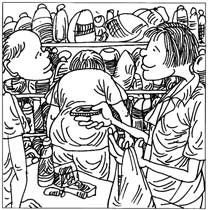Liang Hongfu
Hooray for plastic bag tax
By Hong Liang (China Daily)
Updated: 2007-06-05 07:26
 |
Large Medium Small |
 The Hong Kong government is finally taking the initiative to dispel the curse of plastic bags with the magic wand of a 50 Hong Kong cent levy on each offensive item.
The Hong Kong government is finally taking the initiative to dispel the curse of plastic bags with the magic wand of a 50 Hong Kong cent levy on each offensive item.
Even those of us who are passive environmentalists should applaud this move because plastic bags, in many different sizes and colors, have become such a huge nuisance. Jettisoned plastic bags are everywhere - littering the streets, floating on the harbor, clogging the drains and flying in the air on a windy day.
Oh yes, Hong Kong people are addicted to the use of plastic bags. Official estimates show that each Hong Kong person uses and disposes of about three plastic bags every day. That adds up to more than 350,000 tons of these abominable and non-biodegradable pollutants a year.
It makes us wonder if a mere 50 cent levy is sufficient to wean our fellow citizens from the plastic bag habit. Of course, the small cooked-food stores are not going to put a $1 portion of fried noodles in a plastic bag that costs more than 50 cents with the government levy. But a customer buying hundreds of dollars of produce at a supermarket probably won't mind a small surcharge on plastic bags.
In some other countries and regions, the levy on plastic bags is set at a much higher level. It is reported that the high levy in Ireland, equivalent to HK$1.5, has helped reduce the use of plastic bags by as much as 90 percent. Considering Hong Kong people's much stronger addiction to plastic bags, it would make sense for the government to propose an even higher levy than the Irish.
While we're on the topic, we would also suggest that the government consider levies on the use of Styrofoam lunch boxes and wrappers, and various disposable plastic utensils. They are a common eyesore in our otherwise idyllic parks and pristine beaches.
These levies can bring in a sizable increase in recurrent public revenue when the government is exploring ways to broaden Hong Kong's narrow tax base.
According to the government's conservative estimates, Hong Kong people use a total of more than 18 million plastic bags a day. Multiply that by 50 cents, the proposed levy, and you get HK$9 million of daily revenue. That works out to be more than HK$3 billion a year, which is certainly no small change. Even if the usage is cut by half because of the levy, there should still be more than HK$1 billion in additional revenue.
There is no published data on the use of Styrofoam boxes and plastic wrappers. But the daily total should number in the millions judging by their widespread use in supermarkets, fast-food restaurants and take-out places.
In fact, environmental taxes were among the list of proposals to help broaden Hong Kong's tax base. It is widely expected that such levies aimed at improving our environment by making the polluters pay will be more readily accepted by the public than other forms of consumption tax.
The list of products judged to be harmful to the environment, and therefore subject to levy, can be expanded from time to time. Such a list could potentially include such products as personal computers and batteries.
Let's start with the most obvious one, the plastic bags.
E-mail: [email protected]
(China Daily 06/05/2007 page10)
| 分享按鈕 |